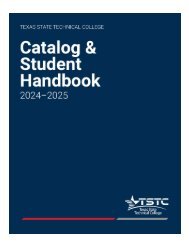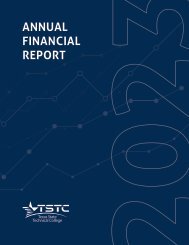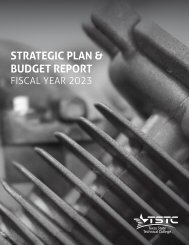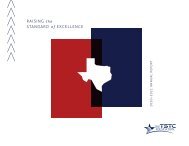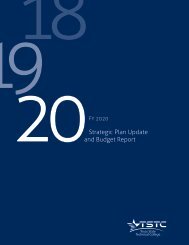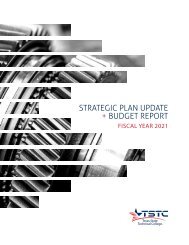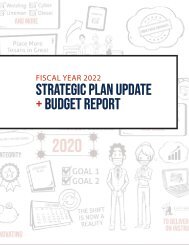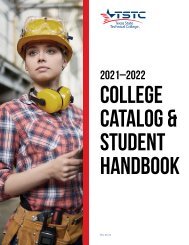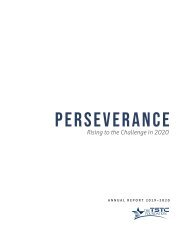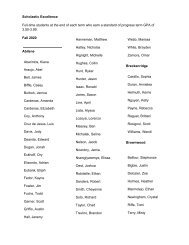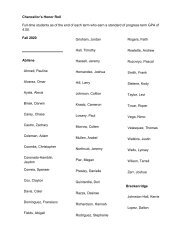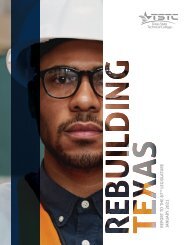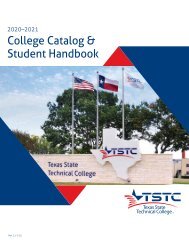Student Handbook and Catalog 2021-22 V2
Create successful ePaper yourself
Turn your PDF publications into a flip-book with our unique Google optimized e-Paper software.
78 | College <strong>Catalog</strong> <strong>and</strong> <strong>Student</strong> <strong>H<strong>and</strong>book</strong><br />
Disciplinary Conference (Conference) – an informal<br />
conversation with the student to review the alleged<br />
violation(s) <strong>and</strong> give them an opportunity to respond<br />
directly <strong>and</strong> present relevant information including<br />
witnesses, documents, etc.<br />
Drug Paraphernalia – any equipment, product, or material<br />
that is used for making, using, or concealing drugs,<br />
regardless of that item’s intended use at the time of its<br />
production.<br />
Established <strong>Student</strong> Relationship – from the time of<br />
application for admissions to the College through an<br />
award of degree which will include breaks of enrollment<br />
if the student continues to have an association with the<br />
College.<br />
Notice of Complaint – the initial document that identifies<br />
alleged misconduct in violation of the Code.<br />
Review – a request made by a student who disagrees with<br />
the Conduct Officer’s decision or sanction <strong>and</strong> requests<br />
that the <strong>Student</strong> Conduct Review Board evaluate the<br />
decision.<br />
Review Administrator – Chair/individual assigned to<br />
collect, schedule, <strong>and</strong> be a liaison for the review process.<br />
Preponderance of Evidence – the majority of the evidence<br />
would cause a reasonable person to support a conclusion<br />
(it is more likely than not it happened, 51 percent rule).<br />
Residential Facilities – any facility operated by the College<br />
or under agreement by an outside agency, with sole<br />
purpose of providing housing for students.<br />
<strong>Student</strong> – an individual who has established a relationship<br />
with the College for the purpose of taking a course or<br />
courses.<br />
<strong>Student</strong> Conduct Review Board – a group convened at<br />
the request of a student or student group to evaluate the<br />
Dean’s decision or sanction placed on an individual.<br />
Working Day – Monday through Friday, except for official<br />
college holidays or college closings.<br />
Application<br />
• The Code shall provide an educational <strong>and</strong> nonadversarial<br />
process designed to resolve matters<br />
concerning student conduct. It is not designed to be a<br />
legal or judicial process.<br />
• The Code is designed to be reliable, fair, <strong>and</strong> effective.<br />
• Individuals who have established a student relationship<br />
with the College are subject to the Code.<br />
• The Code shall apply to all aspects of campus life,<br />
including those in the classroom, on College property,<br />
in residential facilities, <strong>and</strong> at an off-campus sponsored<br />
activity. It may also apply to conduct that occurs offcampus.<br />
• The Code shall operate by preponderance of evidence.<br />
(The majority of the evidence would cause a reasonable<br />
person to support a conclusion.)<br />
• Disciplinary records shall be maintained by the Conduct<br />
Officer or designee of the local campus in accordance<br />
with the College’s records <strong>and</strong> retention policy.<br />
• The College’s disciplinary process shall proceed<br />
during the pendency of any related criminal or civil<br />
proceedings <strong>and</strong> shall not be subject to reconsideration<br />
even if related charges are dismissed or otherwise<br />
resolved.<br />
• <strong>Student</strong> clubs/organizations shall be expected to<br />
conduct themselves in a manner consistent with the<br />
College’s function as an educational institution. <strong>Student</strong><br />
clubs/organizations must observe all international,<br />
federal, state, or local laws, as well as the College’s<br />
policies, including the Code, both on-campus <strong>and</strong> offcampus.<br />
Prohibited Conduct<br />
The Conduct Officer may initiate disciplinary proceedings<br />
against a student for violations of the Code. Specific<br />
examples of prohibited conduct subject to disciplinary<br />
action include, but are not limited to, the following:<br />
A. Acts Violating Statewide Operating St<strong>and</strong>ards (SOS),<br />
<strong>and</strong> College Policies.<br />
B. Acts of Dishonesty<br />
1. Intentionally furnishing false or misleading<br />
information to the College or a college official.<br />
2. Forging, altering, falsifying or misusing any college<br />
document or instrument of identification.<br />
3. Intentionally interfering with any election process.<br />
C. Acts Affecting the College Community<br />
1. Engaging in disruptive behavior or activity,<br />
including but not limited to such acts defined in<br />
the Texas Education Code.<br />
2. Failure to comply with the reasonable directive(s)<br />
of a college employee which includes Resident/<br />
Community Assistants.<br />
3. Failure to heed an official summons within the<br />
designated time or failure to identify oneself to<br />
an institutional representative in response to a<br />
request.<br />
4. Violation of a rule or regulation relating to<br />
residence life policies, a breach of a housing<br />
contract/lease or motor vehicle regulations.<br />
5. Gambling in any form.<br />
6. Failure to fulfill financial or contractual<br />
obligation(s) to the College.<br />
7. Engaging in or use of obscene, lewd, or vulgar<br />
tstc.edu<br />
Texas State Technical College



